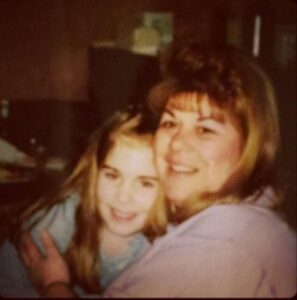Posts Tagged ‘guilt’
Creating Mother’s Day Traditions as a member of the Dead Mom Club
About a week after Easter this year, I noticed I was starting to feel off. My sleep wasn’t as restful, experiencing tension in my body, at times I was getting irritated with the simplest things. Then while streaming an episode of television, 4 ads back to back all talking about Mother’s Day. Then came the promotional emails, the store displays, and even a banner at the top of my Microsoft Word app directing users to their Mother’s Day templates.
Each year, my relationship with Mother’s Day has changed and it will likely continue to transform for the rest of my life. Early in my grief, I avoided any reminders. It was so difficult to work my part-time job in high school with Mother’s Day displays all around me, hearing about patrons’ plans, and then being asked how my own family would celebrate. I would feel my grief weigh heavily on my body, wanting to sleep until June 1st if I could. My first few Mother’s Days were about survival mode, and getting through my waves of grief.

Photo of Jessica and her mother, facing the camera and smiling.
I’m not crushed by my Mother’s Day grief these days in the same way, but I know it is a time of year for me when my grief can show up more. Thoughts about what she would think about streaming platforms; the things I want to tell her; the things I want to thank her for. As my grief has changed these past 18 years, I’ve written letters to my mom, worn pieces of her jewelry, visited her gravesite, bought and written a Mother’s Day card she would have liked, and made some of my favourite childhood recipes of hers.
I would spend many of my Mother’s Days with my grandmother, my mom’s mom as I knew that day held its difficulties for her too. As my grandmother’s health declined over the pandemic, I wasn’t always able or allowed to visit with restrictions. After she died in 2021, I was in a fog by the time Mother’s Day 2022 came around. It felt surreal to me, that on my mother’s side – there are no longer any living maternal presences in my life.

Photo of Jessica wearing a blue satin dress and her mother wearing a long black and
white floral jacket , holding hands as if they are dancing for the camera.
Last year, a friend and another member of the Dead Mom Club were talking about how much this time of year can impact us. These conversations led to something surprising, and beautiful, but also a new tradition that I look forward to engaging in this year. Last Mother’s Day, we had dinner at a nice restaurant downtown, dressed up, and spent an evening talking about our moms. I wore a skirt that belonged to my grandmother and some jewelry that belonged to my mom. My friend also shared items they were wearing or keeping with them that reminded them of their mom. We laughed, we cried, we hugged. It was so cathartic to talk about the things some of our other friends couldn’t quite understand. At times dreading that 2nd Sunday in May, I now know that I can hold space for the difficult emotions that may arise and that I can also look forward to it. To look forward to having dinner with a dear friend, to holding space for the joy, love, and grief we have for our moms, to feel a little less alone on a day that can feel isolating as the rest of the world celebrates it.
_____________________________________________________________________________________________
By Jessica Milette, MSW, RSW . Grief Stories Healthcare Consultant
Jessica is a registered social worker and owner and of Cultivating Connections. Her expertise includes helping individuals and families facing anticipatory grief, ambiguous loss, disenfranchised losses, and sudden deaths. Jessica believes in the power of connection; within ourselves, with those who have died, those we are in relationship with, and with our greater communities. Through sharing our stories of grief and loss, we tend to our connection with those who have died and creating connections with others.
Jessica is a white woman living on the traditional territory of the Anishnabek, the Haudenosaunee, the Attiwonderonk, and the Mississaugas of the Credit peoples, also known as Guelph, ON.
Shannon – Guilt vs Shame
Shannon – Guilt vs Shame
Shannon talks about guilt can be a part of the grieving process but shame has to do with “is there something wrong with me”
Karyn and Aidan – The what if game and guilt
Karyn and Aidan – The what if game and guilt
Karyn and Aidan explain how they have dealt with guilt
Forgiveness at the End of a Life
Post by Maureen Pollard, MSW, RSW
Forgiveness at the End of a Life
One of the most difficult things about death can be the experience of unresolved conflict. When we’ve had a turbulent relationship with the person we are grieving for, it can really complicate our feelings. Forgiveness is a good goal, but it can be hard to navigate.
When a Person is Dying
It may be that a person who has been diagnosed with a terminal illness and is moving toward the end of life wants to tend to unfinished business. They may feel remorse, or have a strong desire to make amends and set things right. If this is the case, it may be that you welcome their overtures and feel ready to forgive them.
If you don’t feel ready, you are not obligated to forgive. Some damage is deep, with far-reaching consequences. Your healing will not necessarily happen on a timeline that works with the time that is left to the dying person who seeks forgiveness.
Alternately, it may be that you want to forgive their actions and look for opportunities to mend the rifts but they continue whatever attitude and behaviour caused the wounds you feel. It’s important to know that some people do not seek to redeem themselves in response to impending death. That is not your fault and you can’t control it. You can still do the work of releasing yourself from the cycle that has harmed you.
When a Person has Died
When someone dies suddenly, there may be no opportunity for conversations or actions that might have happened to help heal emotional wounds in a relationship. You’re left with unsettled feelings that may include anger, guilt, regret and shame, with no way to address them directly with the person.
Finding Forgiveness
Anger is an acid that can do more harm to the vessel in which it is stored than to anything on which it is poured.
Mark Twain
It may be helpful to remember that forgiveness is for you. It is a personal process of releasing the pain of past wrongs against you. Forgiveness can happen whether or not the other person shows regrets or tries to make up for past wrongs.
Acknowledge your pain.
Accept it as your response to the other person, and allow yourself to feel the wound.
Seek some understanding of their motivation. What led them to those hurtful attitudes and behaviours?
Consider the possibility that they were doing the best that they could, even if their best was not very good and may have caused you to feel quite hurt.
Release yourself from the pain.
Give yourself permission to forgive them.
When you are ready, forgiveness is a great gift that you give to yourself.
Adrianna – Guilt and death by suicide
Adrianna – Guilt and death by suicide
Adrianna gives insights she has found about guilt
Guilt and Remorse in Grief Work
Guest post by Sharron Spencer, SSW-G, RSSW
Sharron Spencer is a Registered Social Service Worker working in the field of Mental Health & Addictions since 2014, as a second career. Sharron currently works as the Grief & Bereavement Coordinator at Hospice Georgina. She trained in the Child & Youth Grief and Bereavement Certificate program with Sick Kids Mental Health/Hincks Dellcrest, and is nearing completion of a degree in Thanatology (the study of death, dying and bereavement) with Western University. Sharron is a training facilitator with PalCare Network of York region; providing palliative education programs to volunteers and professionals in Spirituality, Grief & Bereavement and Care for the Caregiver and also a certified facilitator of Powerful Tools for Caregivers. Sharron is also a Certified Funeral Celebrant.
Most of us don’t think about our own mortality. Often, it isn’t until we are affected by a diagnosis or sudden death personally that we have to learn how to cope with the shock, fear, anger, sadness, guilt, numbness and many other emotions that result from a death, or dying. We have become a death-denying society that resists all things related to death and dying. Our loved ones are cared for in hospital and their bodies are cared for by the funeral homes. In many ways we don’t know what or how to grieve.
When diagnosed with a life threatening illness, one is often filled with guilt and regrets; their lifestyle, choices they made, becoming a burden to others who will need to help provide care, leaving a family without an income and many other thoughts cross their mind.
Children and youth may be left with guilt and remorse after the death of a parent or other family members. They may believe they caused their loved one to become ill because they didn’t ‘behave’ the way they were asked to, or they may feel terrible because they fought with the person, or they didn’t spend enough time with their loved one because they didn’t really believe they were gong to die. It’s important to explore these possible thoughts and feelings with children and youth, helping them understand the death in an honest, age-appropriate way. This can help prevent them from imagining worst-case scenarios where they are to blame.
A caregiver to a loved one with a disease such as dementia can be filled with guilt for being exhausted and feeling resentful towards their loved one due to the amount care and attention that is required. They may also feel guilt for grieving the loss of their hopes and plans that have been lost due to the illness.
Guilt and remorse can overwhelm us whether we are grieving the death of someone we love or facing the end of our own life. These feelings are normal and very common. The trick is to not let the guilt take over and stop you from grieving your losses.
When we must watch someone we care about as they suffer and decline, we may feel helpless. That powerlessness can turn into guilt that we weren’t able to “fix” things. Even when we understand logically that there was absolutely nothing that we could’ve done differently, our heart takes on this guilt. Professional help can help you find self-compassion and forgiveness.
It can also be therapeutic to write a letter to our loved one who has died. Write about your feelings, including the guilt and the remorse. I often suggest to people to burn or shred the letter to release the guilt, shame and remorse. These painful feelings don’t serve you and won’t change the outcome. You can let them go and trust that you did the very best you could for your loved one under the difficult circumstances you faced at the end of life.
Lynda – “Guilt during a time of crisis”
Lynda – “Guilt during a time of crisis”
Lynda discusses how to deal with guilt.
Lynda – “Old age home and guilt”
Lynda – “Old age home and guilt”
Lynda discusses how hard it is during the pandemic to have a loved on in an old age home
Lynda – ‘Pandemic and triggers”
Lynda – ‘Pandemic and triggers”
Lynda discusses how hard it is during the pandemic to avoid triggers
Sharron “Grieving During the Pandemic”
Sharron “Grieving During the Pandemic”
Sharron talks about how Covid-19 has really affected and disrupted the way people are grieving.
Krista – “They are not trying to kill themselves”
Krista – “They are not trying to kill themselves”
Krista explains they are not trying to kill themselves. Krista continues to grieve the death of her son from opioid overdose.
Krista – “How a counsellor helps”
Krista – “How a counsellor helps”
Krista explains how a grief counsellor has helped.



